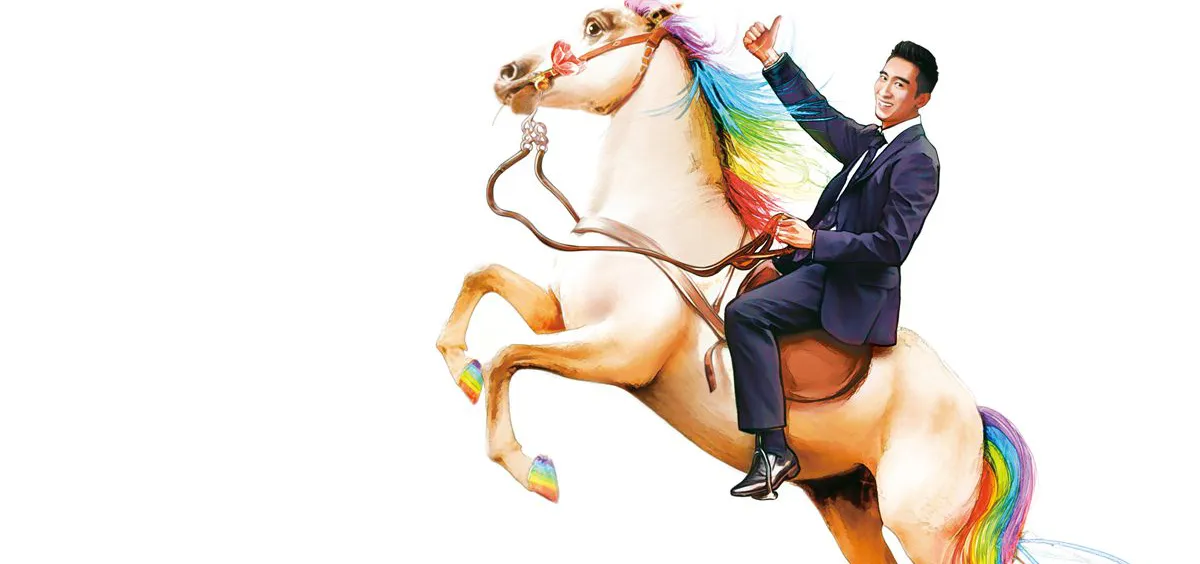How to flatter, cajole, and give compliments like a pro
An ancient Chinese proverb states, “Faithful words often offend the ear but are good for improving one’s conduct (忠言逆耳利于行).” Some people, though, would rather hear and tell sweet lies, and to hell with their conduct, believing that “A kind word brings warmth even in the coldest winter (良言一句三冬暖).”
These people appear to be in the majority today, at least if social media is any indication. When pictures of a baby sucking its toes get posted, friends jump to congratulate the parents on how cute and potentially brilliant their offspring is; movie stars dining out on hot pot engender a storm of Weibo “likes” for this mundane action, as well as thousands of fans flocking to the same restaurant. College students have even formed WeChat groups solely for admiring and uplifting one another, known as “praise groups (夸夸群).”
Recipients of these compliments often know they are not sincere. Still, whether in business or friendship, we are expected to exchange niceties with our fellow humans—the ideal of a “harmonious society,” after all, is “you are good, I am good, and everyone is good.” This has led to the creation of many generic, one-size-fits-all compliments and linguistic tricks to imply admiration in any social situation, often delivered with such professional aplomb that people have nicknamed them “commercial mutual flattery (商业互吹).”
Even people who enjoy and expect praise, though, may be on guard against empty flattery. Thus, it takes a degree of linguistic finesse to sound like you mean your compliments. The primary principle is to base your praise in facts, rather than fabricate merits that don’t exist. For instance:
Your eyes are so charming.
Nǐ de yǎnjīng zhēn mírén.
你的眼睛真迷人。
That’s a pretty generic compliment, and depending on the context, it may sound disrespectful or overly familiar to the other person. If you want to praise without making loaded judgments on people’s appearance, you will have to be more specific:
Your eyes are a very special color.
Nǐ yǎnjīng de yánsè hǎo tèbié.
你眼睛的颜色好特别。
Your eye makeup looks really natural today.
Nǐ jīntiān de yǎnzhuāng kànzhe zhēn zìrán.
你今天的眼妆看着真自然。
In discussions of personal appearance, one tricky word often appears: 气质 (qìzhì, presence). On one hand, it is widely used to describe someone as not just good-looking, but distinguished and charming:
Your presence is really special.
Nǐ zhēnde tài yǒu qìzhì le.
你真的太有气质了。
On the other hand, praising something as abstract as “presence” tends to make the listener think you couldn’t find anything more concretely attractive about them, so it’s often important to explain what kind of 气质 you mean:
You really have the air of an artist. If I didn’t know you were a lawyer, I would think you were a painter!
Nín zhēnde fēicháng yǒu yìshù qìzhì. Rúguǒ bù zhīdào nín shì wèi lǜshī, hái yǐwéi nín shì ge huàjiā ne!
您真的非常有艺术气质。如果不知道您是位律师,还以为您是个画家呢!
Of course, it’s not good to focus on appearance alone. Skills are often less tricky and more socially appropriate objects of praise:
You play tennis like a pro!
Nǐ wǎngqiú dǎ dé kānbǐ zhuānyè xuǎnshǒu!
你网球打得堪比专业选手!
If there is nothing spectacular about the ability, just focus on the progress:
You are playing much better compared to two months ago! You must have practiced a lot!
Nǐ dǎ de bǐ liǎng gè yuè qián hǎo tài duō le! Yídìng méi shǎo liànxí ba!
你打得比两个月前好太多了!一定没少练习吧!
Giving extra details will also help make your compliments sound sincere. When sending compliments to the chef, don’t just tell them it “tastes great,” but add some extra technical or emotional adornment:
This fish tastes so good that I could cry!
Zhè yú jiǎnzhí hǎochī dào kū!
这鱼简直好吃到哭!
This West Lake Carp in Sweet and Sour Sauce is so authentic. The sauce tastes exactly the same as what I had in Hangzhou years ago.
Zhè dào xīhú cùyú zuò de shízài tài dìdao le. Zhège jiàngzhī de wèidào hé wǒ jǐnián qián zài Hángzhōu chī dào de yìmú-yíyàng.
这道西湖醋鱼做得实在太地道了。这个酱汁的味道和我几年前在杭州吃到的一模一样。
It’s important to tailor your praise to the occasion. In a professional setting, for instance, it would be more appropriate to praise someone for their competence rather than their tastes in fashion. When meeting someone well-known, it’s a good strategy to praise their past achievements to sound like you are well-informed:
I saw your award-winning pieces from years ago. They were very impressive. I am so glad to have the opportunity to work with you.
Wǒ jǐnián qián jiù kàn guò nín de huòjiǎng zuòpǐn le, yìnxiàng fēicháng shēnkè, hěn gāoxìng zhōngyú yǒu jīhuì hé nín hézuò le.
我几年前就看过您的获奖作品了,印象非常深刻,很高兴终于有机会和您合作了。
Better yet, find out their lesser-known talents, and then you will really impress:
I have heard of your success in business, but I didn’t know that you have done so much philanthropic work.
Nín shēngyì zuò dé hǎo wǒ zǎo yǒu ěrwén, dàn bùzhīdào nín hái zuò le zhème duō císhàn gōngzuò.
您生意做得好我早有耳闻,但不知道您还做了这么多慈善工作。
Sometimes, there’s no way to dress up a straightforward compliment to make it sound less like idle flattery. Psychological stratagems may be needed to disguise praise as something else entirely. One trick, encapsulated by the Chinese idiom “欲扬先抑 (exalt after diminishing),” calls for saying something negative first to make you sound like a harsh critic, then adding a positive twist:
To be frank, when I started reading your novel, I thought it was just another cliché. But as the plot unfolded, I was completely fascinated by the unexpected developments, and felt that the author must be a genius.
Shuō shíhuà, dú dào nǐ zhè běn xiǎoshuō kāitóu de shíhou, wǒ yǐwéi zhè yòu shì yí gè lǎo tào de gùshi. Dànshì suí zhe qíngjié de zhǎnkāi, yíqiè dōu nàme chūrényìliào, wǒ wánquán bèi mízhù le, juéde zuòzhě kěndìng shì gè tiāncái.
说实话,读到你这本小说开头的时候,我以为这又是一个老套的故事。 但是随着情节的展开,一切都那么出人意料,我完全被迷住了,觉得作者肯定是个天才。
Another strategy is to disguise a compliment as an expression of envy:
If I were as tall as you, I wouldn’t need to wear high heels.
Rúguǒ wǒ gèzi yǒu nǐ zhème gāo, wǒ jiù búhuì chuān gāogēnxié le.
如果我个子有你这么高,我就不会穿高跟鞋了。
Wow, you graduated from Tsinghua University? That was my dream school!
Wa, nǐ shì Qīnghuá bìyè de? Wǒ zhēnshi zuòmèng dōu xiǎng shàng Qīnghuá!
哇,你是清华毕业的? 我真是做梦都想上清华!
You can also avoid praising people directly, and imply that you’re simply feeling happy on behalf of others:
How did your boss find an employee as capable as you?
Nǐ lǎobǎn shì zěnme zhǎodào nǐ zhème nénggàn de yuángōng de?
你老板是怎么找到你这么能干的员工的?
The ability to disguise compliments was previously considered an indispensable skill for a professional praise-giver. Yet, as recent screenshots posted from WeChat “praise groups” have shown, not everybody needs their compliments to be believable. Misery loves company, and youths who join these virtual support groups often just want a sympathetic ear for their troubles, or a simple confidence boost:
A: Depressed after a breakup. Want to skip class. Need praise.
Shīliàn le yùmèn, xiǎng qiàokè. Qiú kuā.
失恋了郁闷,想翘课。求夸。
B: Do it! You are so smart, you will catch up in no time!
Qiào a! Nǐ zhème cōngmíng, bú shàngkè yě gēndeshàng!
翘啊!你这么聪明,不上课也跟得上!
C: You are too hardworking! You deserve a break!
Nǐ tài yònggōng le! Yīnggāi xiūxi yíxià!
你太用功了!应该休息一下!
D: By not going out today, you do a great service toward reducing the planet’s emissions.
Bù chūmén yě shì wèi jiénéng jiǎnpái zuò gòngxiàn a!
不出门也是为节能减排做贡献啊!
These circles of self-indulgence haven’t escaped criticism from older netizens and mainstream newspaper columnists. Raised on the gritty diet of revolutionary fervor, older generations are often baffled by millennials’ seeming preference for insincere flattery over “eating bitterness.”
However, the Weibo account of the Party-run People’s Daily has applauded “praise groups” as a form of “psychological adjustment…[that] alleviates modern anxieties” and “adds to everyday happiness.” Other supporters argue there’s nothing wrong with adding more positivity to the internet, where trolling and bullying comments are more often the norm. After all, flattery is the gift that keeps on giving—those who hear sweet words will usually return the compliment:
Thanks for all the likes! You are truly the nicest kids on the block!
Xièxiè diǎnzàn! Nǐ zhēn búkuì shì zhěng tiáo jiē shang zuì tián de zǐ!
谢谢点赞!你真不愧是整条街上最甜的仔!
Sweet Nothings is a story from our issue, “Tuning Up.” To read the entire issue, become a subscriber and receive the full magazine. Alternatively, you can purchase the digital version from the App Store.













